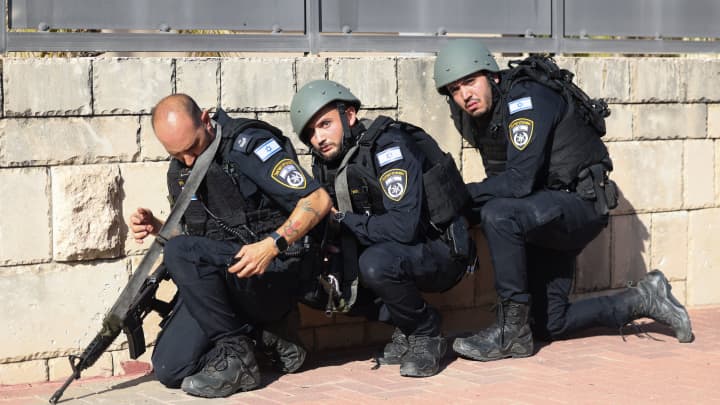
The by on Israel suggests a massive intelligence failure as the Israeli government appeared blindsided by the infiltration of Hamas fighters across the southern border and the launch of thousands of rockets.
The Hamas assault by air, land and sea also raised questions as to why U.S. intelligence agencies apparently did not see it coming, experts and former intelligence officials said.
U.S. officials said that if the Israelis knew an attack was imminent, they did not share it with Washington.
"We were not tracking this," one senior U.S. military official told NBC News.
U.S. officials are discussing enhancing intelligence sharing with the Israelis to support the Israeli government in response to the Hamas attack, according to a U.S. official and a source familiar with the discussions.
The additional intelligence to Israel could include information gathered from drones, eavesdropping and satellites, but the officials did not elaborate.
The onslaught took place a day after the 50th anniversary of the 1973 Arab-Israeli war and carried echoes of that conflict, when Israel was caught flat-footed by a coordinated offensive by its Arab neighbors, led by Egypt and Syria.
"This is Israel's 9/11. Not since 1973 has there been such a catastrophic intelligence failure in Israel," said Marc Polymeropoulous, who worked for 26 years for the CIA, where he specialized in counterterrorism, the Middle East and South Asia.
Israel's intelligence services have long been seen as some of the most capable in the world, with an array of human intelligence, eavesdropping and other technical means blanketing the West Bank and .
"It is almost inconceivable how they missed this," said Polymeropoulous.
It was also unclear why U.S. intelligence agencies apparently did not see the attack coming, as well as friendly Arab states such as Egypt, Jordan, Qatar and Saudi Arabia, he said. "I am stunned."
But Colin Clarke, senior research fellow at The Soufan Center, a nonprofit that focuses on global security issues, said Israel had to bear the main responsibility for failing to anticipate Saturday's attack.
"Israel has exquisite, world-class intelligence collection and analysis capabilities and would have a far better picture of what's going on in its own backyard. This one falls squarely on the Israelis," he said.
Clarke added it was an open question whether recent domestic political turmoil in Israel had possibly played a role in the apparent intelligence failure.
David Friedman, who was U.S. ambassador to Israel in the Trump administration, said: "In the 40 or more years that I've been following Israel one way or another, I've never seen this happen. I've never seen the border breached in this manner. Usually, even one person from Gaza gets close to the border, they're intercepted and neutralized long before they can do anything. This is just something I've never seen before. It's of course a large intelligence failure."
U.S. officials said early assessments are that the timing of the Hamas attack was related to signs that a deal normalizing relations between Saudi Arabia and Israel was close to being clinched. They also said that the 50-year anniversary of the 1973 Arab-Israeli war also may have been a factor.
In the wake of the attack, both Hamas and Hezbollah said the attack represented a warning to any Muslim country seeking to strike peace with Israel.
More from NBC News:
Hamas spokesman Ibrahim Hamad said on Al Jazeera television that the attack on Israel is "absolutely a message" to Muslim countries seeking normalization with Israel. He urged them to absolve themselves of this "great shame."
The Israeli newspaper Haaretz reported that senior Israeli military officers and officials had assessed, as recently as last week, that Hamas wanted to avoid a full-blown conflict with Israel. NBC News could not immediately verify that report.
"I'm truly astonished for something of this magnitude to go down and for the Israelis to have no clue that this is about to happen. I'm just speechless," said Clarke, of The Soufan Center. "They have had sources inside these Palestinian groups for years."
CIA Director William Burns was due to give a keynote speech Saturday at a national security conference in Georgia organized by the Cipher Brief media outlet but canceled because of the crisis in Israel, his spokesperson, Tammy Thorp, said.
For the moment, Israel — and the United States — are preoccupied with the immediate crisis but in time there will inevitably be demands for an inquiry as to how Israel could have been caught off guard by such a large-scale and sophisticated attack, experts said.




